King Erysichthon: The Price of Pride
Reading Time: 11 min
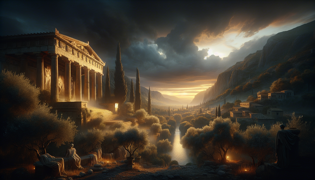
About Story: King Erysichthon is a from greece set in the . This tale explores themes of and is suitable for . It offers insights. A dark tale of hubris and nemesis.
Introduction
In the waning light of an ancient Greek afternoon, the city-state of Halcyon stretched out beneath a sky brushed with the dying hues of twilight. Its streets, paved with time-worn stones, carried whispers of old legends, and the palace of King Erysichthon stood defiant against the encroaching shadows. This grand edifice boasted towering columns and intricate friezes, now softened by the gentle encroachment of dusk. In every recess, from the echo of a distant lyre to the murmurs of olive trees stirred by a mild breeze, there was an unspoken warning—a tale of ambition walking hand in hand with fate.
Here, in this realm of beauty and concealed dread, the king's penetrating gaze surveyed his dominion with a fierce intensity. Embellished with a crown of golden laurels and robes woven with the pride of his lineage, Erysichthon exuded a charisma that was impossible to ignore. Yet, beneath the veneer of splendor and confident command lay the early tremors of his tragic destiny. The kingdom’s residents, though awed by his achievements, sensed that in the interplay of light and shadow, the seeds of a great undoing were quietly taking root.
As the last rays of sunlight spilled across marble facades and ancient statues, the stage was set for a saga that would recount the inexorable clash between mortal arrogance and divine precision. Every whisper of the wind, every soft ripple along the Aegean shores, bore witness to a holy reckoning waiting in the wings. It was a moment suspended between mortal hope and eternal retribution—an introduction not just to a reign of splendor, but also to an inevitable descent into despair.
The Rise of a King and the Seed of Ambition
In the cradle of ancient Greece, where myth and history commingled beneath cerulean skies, a young Erysichthon began his path to greatness. Born into a lineage that boasted both legendary valor and warnings of divine retribution, he was raised amongst philosophers, poets, and warriors. As a boy, his keen eyes burned with a relentless ambition; he learned early that greatness could be snatched from the grasp of fate if one dared to challenge destiny itself. His tutors, wise and steeped in the lore of the gods, told him that mortal pride was often the precursor to eternal sorrow. Yet the spark of defiance had already ignited within him—a conviction that human willpower could transcend divine mandate.
Ascending the throne in a time of both prosperity and unease, King Erysichthon quickly transformed his palace into a symbol of his newly affirmed authority. Lavish banquets, sumptuous draperies, and art commissioned from the most skilled of local craftsmen filled his halls. Courtiers in embroidered robes whispered reverently about his intellect, while the clink of silver and the rustle of finely woven garments filled the air with promise. Every corner of his grand abode, from the vaulted ceilings to the mosaic floors, reflected his unyielding belief in man’s supremacy over nature and the gods.
Yet as he reveled in the trappings of power, the ambitious monarch began to reinterpret the ancient tales. The gods, once considered venerable custodians of cosmic order, became adversaries to be outsmarted. In the hush of midnight, by the flickering light of oil lamps, Erysichthon pored over scrolls of legend with a mix of awe and defiance. These quiet moments revealed a man intoxicated by his own potential—an individual who believed that even the heavens themselves might bow to his will. His inner circle, though discreetly alarmed, could not help but be captivated by the visionary fervor that drove him to seek ever greater monuments of human achievement.
In the interplay of soft candlelight and the encroaching darkness of his private studies, every gleaming artifact and engraved inscription became a testament to his unbridled pride. The mosaic depictions of gods and heroes that once served as gentle reminders of human limitations now spurred him on toward a dangerous frontier: the audacious notion that he might one day realign the cosmos itself to serve his ambition. And so, the seed of hubris was sown deep within the fertile soil of his soul—destined to grow into an unquenchable force that would one day upset the delicate balance between man and the divine.
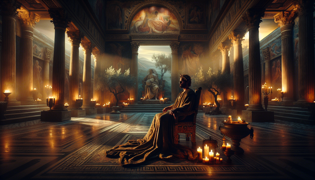
The Divine Omen and the Scorned Warnings
Word of the young king’s defiant reinterpretation of sacred lore soon reached ears attuned to the divine. In the cool, incense-laden corridors of the Oracle at Delphi, solemn seers beheld visions of impending catastrophe. Amid the curling vapors and the rhythmic chant of priestesses, cryptic prophecies foretold a dire destiny: that unchecked pride would awaken the wrath of the gods. In hushed tones, the oracle warned that the very fabric of nature would rend asunder the hubris of a mortal who dared to challenge celestial order.
Outside the marble sanctuaries and lofty temples, in the simple villages that dotted the rugged Greek countryside, omens began to emerge. Humble farmers and shepherds, their lives woven into the natural rhythms of the land, recounted eerie encounters—phantom figures robed in ethereal mist and eyes of incensed fire. These apparitions were believed to be emissaries of the earth, disturbed by the desecration of sacred groves and ancient rites. One fateful evening, as a violent breeze stirred the dust and leaves in cantankerous whispers, the people reported seeing eerie silhouettes encircling a venerable olive tree, their presence a silent testament to nature’s grief and warning.
Yet, driven by his unwavering arrogance, King Erysichthon dismissed such omens as the superstitious tales of feeble minds. His ambition, emboldened by the adulation of his court and the lure of immortal renown, urged him to commission the clearing of a hallowed forest. This sacred wood, venerated by local deities and rich with age-old lore, was to be razed in the name of progress—a monument dedicated solely to his glory. In that moment of impious ambition, an irrevocable line was crossed. The act ignited a dark spark among the gods, and in the silence that followed, distant heavens stirred with wrath.
As a storm gathered on the horizon, heavy with foreboding and broken promises, a tangible tension swept through Halcyon. The soft glow of twilight was abruptly marred by the arrival of turbulent clouds and errant flashes of lightning. In the palace corridors, a chill unlike any other seeped through the stones—a prelude to the divine retribution that would soon cascade upon him. The divine warnings had not been idle; the natural world itself was mobilizing its quiet fury, setting the stage for an inevitable reckoning.
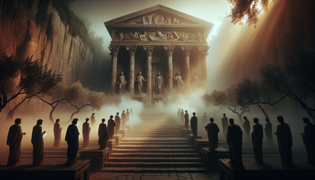
The Curse Unleashed: Hunger and Despair
No sooner had the prophetic winds of fate whispered their warnings than the divine retribution descended upon King Erysichthon. A curse, subtle at first but then all-consuming, began to unravel the fabric of his existence. One morning, as he awoke in the opulent solitude of his private quarters, an inexplicable emptiness seized him—a hunger that no sumptuous feast could ever satiate. This was no ordinary appetite; it was a gnawing, ever-present void that devoured his strength and sanity.
The once-celebrated banquets in his great hall turned into bleak rituals of torment. Every table laden with roasted meats, fresh fruits, and ambrosial wines became a cruel mockery of his former glory. Day by day, it grew harder to ignore the incessant hunger, a reminder of a divine mandate he had so ominously defied. His visage, once vibrant and robust, began to echo the torment within—gaunt, haunted, with eyes that flickered between desperate hope and creeping despair. Servants who had once moved in eager loyalty now exchanged furtive glances and whispered prayers, fearful that the curse was a harbinger of death itself.
As the curse deepened, it subtly eroded not only his physical might but also the moral fiber of his court. Conversations that were once laced with laughter and ambition turned to muted murmurs and furtive warnings. The palace, resplendent with marble statues and delicate frescoes, now served as a prison to a king haunted by his own transgressions. Every bite of food felt like a temporary illusion, a fleeting escape from the perpetual torment that gnawed at his soul. The divine punishment was not merely for his act of hubris in defacing sacred nature—it was a reflection of the internal decay that absolute arrogance breeds.
In the quiet, sorrowful hours before dawn, when the world lay draped in a silver shroud of mist, Erysichthon paced his once-proud corridors in a feverish stupor. There, beneath the wan beam of a solitary oil lamp, he would clutch at remnants of his defeated pride and murmur words of bitter regret. The curse, relentless in its retribution, had transformed the grandeur of his palace into a stage for his private hell—a slow, excruciating descent into despair that even his wealth and power could not postpone. His every step echoed like a lament to the gods he had spurned, echoing a timeless warning: that even the mightiest among men cannot escape the silent, inexorable hand of divine justice.
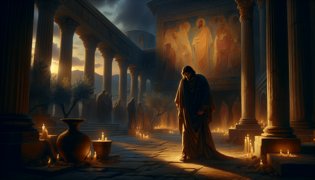
The Reckoning and Fall: A Kingdom in Ruins
The day of reckoning dawned under a leaden sky, as if the heavens themselves had turned against the impious monarch. In the cold, somber light of early morning, a palpable dread gripped the air over Halcyon. The once jubilant streets were deserted, save for small clusters of citizens whose eyes brimmed with apprehension and sorrow. Whispers of revolt stirred in the silence, for the curse had not only ravaged the body of King Erysichthon but had also sown seeds of discontent among his people. Devotion gave way to despair, and admiration quickly turned to fearful resignation.
As the storm of retribution gathered, the mighty king stumbled forward, a mere shadow of the indomitable figure he had once been. The divine forces, long patient, now unleashed their fury in torrents of rain and bolts of lightning. The immaculate facades of his palace, once symbols of eternal glory, were ravaged by the unforgiving elements. Marble columns crumbled under the wrath of nature, while statues of forgotten gods and heroes lay broken in the muddy streets. In that cataclysmic moment, the clash between mortal pride and divine decree became undeniable.
The final confrontation was as much a battle of souls as it was of bodies. Loyal soldiers, trembling in the gloom, turned away from their once-revered leader as the curse left him gaunt and desolate. Family and allies, confused by their own helplessness, could only watch as divine verdicts were executed with unerring precision. King Erysichthon’s desperate eyes, once aflame with ambition, now mirrored the cold, merciless judgment of the skies. In that fateful hour, as the heavens wept and the earth rebelled, his kingdom crumbled into chaos and ruin.
Amidst the swirling rain and collapsing relics of a bygone era, the once-proud king took his final steps along the shattered remnants of his legacy. Every fallen column and every broken statue bore silent testimony to the irreversible cost of his hubris. As the storm receded and a weary, sorrowful calm descended upon the ruined land, the tragic truth emerged: a man who dares challenge the eternal order must ultimately pay dearly for that defiance. In the faded light of that mournful morning, the legacy of King Erysichthon transformed into a timeless ode of caution—a grim reminder to all that not even the brightest ambition may outshine the inexorable power of divine justice.
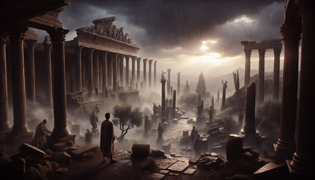
Conclusion
In the quiet aftermath of devastation, as the echoes of a shattered kingdom mingled with mournful winds, the tragic saga of King Erysichthon concluded with a solemn lesson etched in time. His relentless ambition, born of a belief in human supremacy over the cosmos, had ultimately led him to defy the immutable laws of the divine—a defiance that cost him not only his throne but also the very essence of his being. In his downfall, the king became a timeless symbol of the peril inherent in unchecked pride; a living parable whispered by the rustle of ancient olive leaves and carved into the weathered stone of crumbling temples.
In the desolation that followed, the memory of his reign transformed into a fable of caution and sorrow, one that echoed through the ages. Poets, sculptors, and storytellers came to immortalize his tale, reminding future generations that no mortal ambition should ever breach the delicate balance between man and the divine. The ruins he left behind, both a monument to his erstwhile glory and a testament to his tragic arrogance, stood as mute witnesses to the certainty of divine justice. Amidst the silence of those fallen corridors, one could almost hear the murmurs of the gods, cautioning all who might dream of altering fate.
Thus, the story of King Erysichthon endures—not as a mere chronicle of a ruler’s fall, but as a profound meditation on the consequences of hubris. It reverberates with the fragile beauty of ancient Greece, bearing the moral that human ambition must forever bow in reverence before the eternal powers which govern the cosmos. In that final, somber hush lies the enduring legacy of a tragic king, a reminder of the inexorable price exacted by defying the divine order.

















